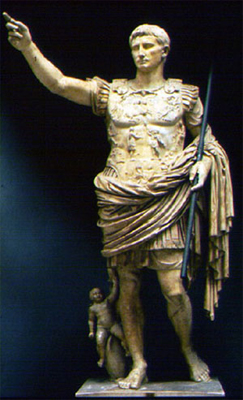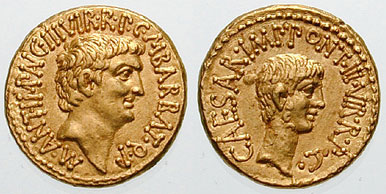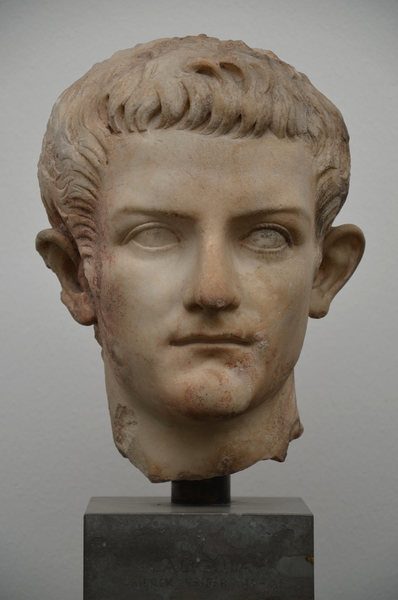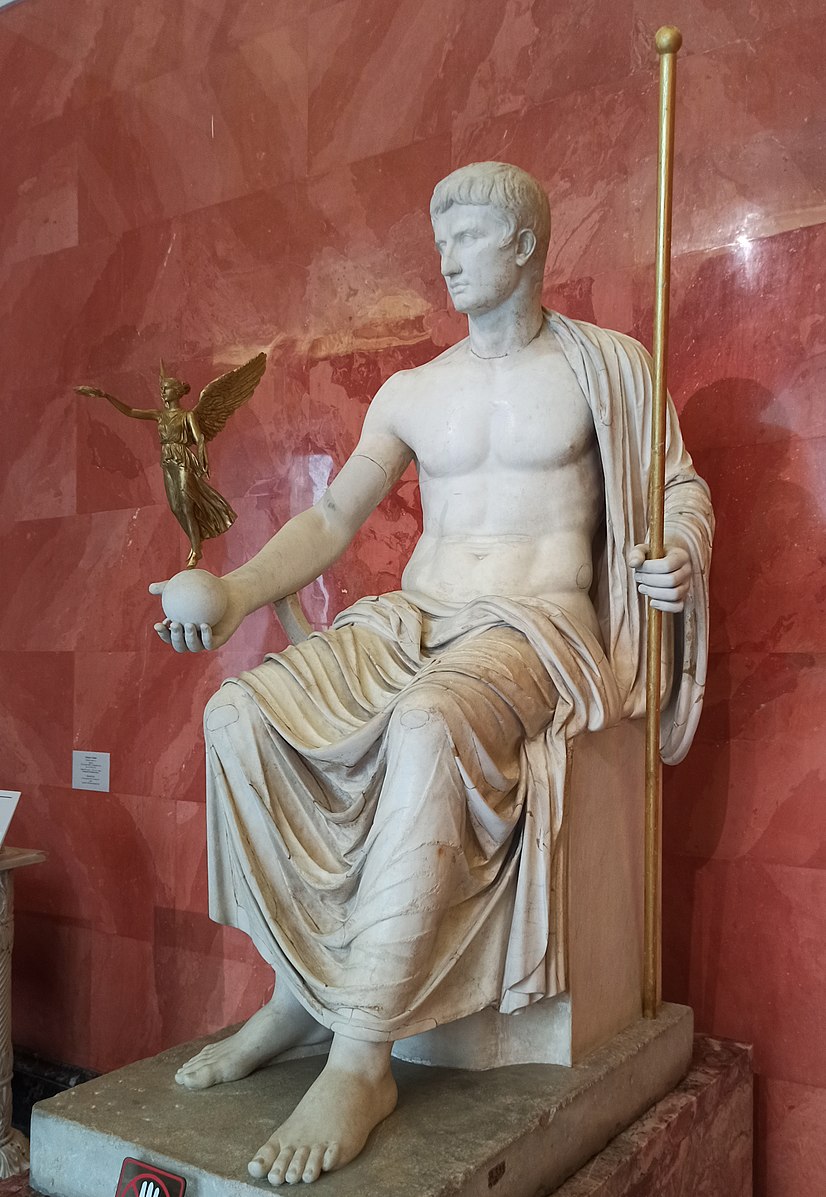CLAS 357
Autocracy (Augustus)
March 18, 2024

Gemma Augustea
(early first century CE)
Study Guide for Examination #2 (Wednesday, March 27)
Response #2 Topics (due Friday, March 22)

Octavian/Augustus (emp. 31?/27 BCE to 14 CE)
Roman autocracy (as enslavement of a nation): Augustus ("the revered one")
Rome's shift to autocracy: failure of Republican (oligarchical) institutions (income equality, class & political conflicts, etc.), emergence of strongmen with personal armies & cults of personality (1st century BCE; cf. fascist "states of emergency")
- Roman Revolution: Republic > Empire; pluralism > monarchy (end of Roman Republic & Roman experiment in constitutional/representative quasi-democracy)
- Julius Caesar (great-uncle of Augustus – mother Atia his niece) vs. Pompey the Great + co-opted armies (49-45 BCE); Caesar becomes "Dictator for life", assassinated (44 BCE)
- Gaius Octavius Julius Caesar (63 BCE-14 CE): heir to Julius Caesar's fortune & troops; consul (43 BCE) with strong military presence in Rome
Suetonius, Deified Augustus 26
He received magistracies and honours before the prescribed age, some of which were newly devised and in perpetuity. The consulship he appropriated in his twentieth year, having positioned his legions near the city ready to attack and sent men to demand it for him in the name of the army. However, when the senate hesitated, the centurion Cornelius, who led the delegation, threw back his cloak, pointed to the hilt of his sword and did not shrink from saying in the senate house: 'This will do it if you don't.'

CAESAR AUGUSTUS /DIVVS IULIV(S) (denarius, 18 BCE)
- formation of Second Triumvirate (Octavian, Antony, Lepidus, 43 BCE); Julius Caesar deified (senate, 42 BCE)
Suetonius, Deified Augustus 13 (Octavian after defeat of Brutus & Cassius at Battle of Philippi, 42 BCE)
He was not restrained in victory but sent the head of Brutus to Rome to be thrown at the foot of Caesar's statue, and was savage in his treatment of the most prominent of the captives, not even sparing them insulting language. When one begged him piteously for burial he is said to have replied that the birds would decide. When two others, a father and son, begged for their lives, they say he ordered them to draw lots or play mora, to determine which of them should have his own life spared, and watched them both die, for, when the father, who had offered to be the one to die, was killed, he then made the son take his own life too

L: Antony; R: Octavian (aureus, 41 BCE)
- brutal proscriptions follow (purge of political enemies & funding troops), e.g. Propertius' family, Perusine War (41 BCE)
Suetonius, Deified Augustus 15 (Perusine War)
After the capture of Perusia, he inflicted punishment on a large number of people, responding to all those who begged for mercy or sought pardon with the same words: 'You must die.' Some people record that three hundred senators and equestrians were selected from those who had surrendered to be slaughtered like sacrificial victims on the Ides of March at the altar dedicated to the Divine Julius. There are some who relate that he engineered the war with the specific purpose that those who were secretly opposed to him and supported him through fear rather than choice would be tempted to follow Lucius Antonius' lead, and that when he had defeated them and confiscated their property he would be able to give the veterans the rewards they had been promised.
Suetonius, Deified Augustus 27 (Octavian as triumvir)
Although he resisted somewhat longer than his colleagues the option of proscriptions, once they were embarked upon he was more severe than either of the others. For while they were swayed in many cases by personal considerations and entreaties in favour of particular individuals, he alone argued strongly that no one should be spared. He proscribed even Gaius Toranius, his own guardian, who had been his father Octavius' colleague as aedile . . . As for the consul designate, Tedius Afer, who had been complaining spitefully about some deed of his, he terrified him with such dire threats that he hurled himself to his death. And when the praetor Quintus Gallius came to pay his respects with some folded tablets covered by his cloak, Octavian, suspecting him of concealing a sword, did not dare to have him searched at once, in case it should turn out to be something else, but soon afterwards had him seized from the tribunal by centurions and their men and subjected to torture as if he were a slave. And, when he admitted nothing, he gave orders that he should be killed, first gouging out the man's eyes with his own hand. He wrote, however, that the man had asked for an audience then treacherously attacked him and that, after he had been thrown into custody and then sent into exile, he had met his end in a shipwreck or an attack by thieves.

Alma-Tadema, The Meeting of Antony and Cleopatra (1883)
- gradual collapse of Second Triumvirate culminates in Octavian's defeat of Mark Antony & Cleopatra at Battle of Actium (31 BCE)
- Gaius Octavius Julius Caesar Augustus (27 BCE): first emperor ("refounding" Rome); propaganda denies civil war; launches "golden age" of peace & prosperity (Pax Romana); Octavian's personal reputation remake
- consolidation of power: appearance of constitutional Republican government as Augustus takes of controls senate, magistrates, assemblies (e.g. consul for 10 years, tribunician powers)
- Augustus' self-representation as defender of Roman Republic (vs. its "opponents"); appearance of preserving legal & legislative framework of Republic (e.g., Octavian's coinage of 28 BCE "consul for sixth time"/ "He revived the rights and laws of the Roman people"); cf. illiberal democracy today, e.g., Hungary, India, Russian Federation, etc.
- principate = rule of princeps ("leading citizen"), primus inter pares; monopoly of military as basis of power/authority (imperator, military commands to friends & family); monopolizes honors (triumphs)


L: Caligula; R; Nero
- principate morphs into monarchy: dynastic monarchy/kingship (Augustus bequeathes power, status, wealth to heir)
Julio-Claudian dynasty: Augustus (31?/27 BCE-14 CE), Tiberius (14-37 CE), Caligula (37-41 CE), Claudius (41-54 CE), Nero (54-68 CE)

Augustan coin celebrating dedication of temple to "Jupiter the Thunderer" (19 BCE) [cf. Suetonius, Deified Augustus 91, "As he used to make constant visits to the Temple of Jupiter the Thunderer which he had dedicated on the Capitoline, he dreamed that Jupiter Capitolinus complained to him that he had taken away his worshippers and that he himself replied that he had placed Jupiter the Thunderer there beside him as a doorkeeper."]
- Roman people trade freedoms for stability of autocracy ("I alone can fix it") (cf. Phaedrus' "The Wolf & the Sleek Dog)
Tacitus, Annals 1.2 (ca. 100 CE)
. . . after laying down his triumviral title and proclaiming himself a single consul content with tribunician authority to safeguard the commons, he first conciliated the army by gratuities, the populace by cheapened corn, the world by the amenities of peace, then step by step began to make his ascent and to unite in his own person the functions of the senate, the magistracy, and the legislature. There was no opposition: the boldest spirits had succumbed on stricken fields or by proscription-lists; while the rest of the nobility found a cheerful acceptance of slavery the smoothest road to wealth and office, and, as they had thriven on revolution, stood now for the new order and safety in preference to the old order and uncertainty.


L: Augutus as Jupiter (first half of first century CE); R: Augustus, Pontifex Maximus (late 1st century BCE)
- flirtation with divinity (enhanced authority): rejects title dominus, but imperial cult established outside Rome; Pontifex Maximus (12 BCE)
Suetonius, Deified Augustus 52-3
Although he knew it was the custom to dedicate temples even to proconsuls, he would not allow them to be dedicated to himself in any province unless they were dedicated to Rome also. Within the city of Rome itself, indeed, he most obstinately refused this honour. Even the silver statues which had earlier been set up to honour him he had melted down, every one, and, with the money raised, he dedicated golden tripods to Palatine Apollo. When the people strongly pressed him to accept the dictatorship, he went down on one knee, threw back his toga, and bared his breast, beseeching them to refrain. He always shrank from the title 'Master' [dominus] as an insult and a reproach. On one occasion at the games when he was watching a farce, the line was spoken: 'O good and just master!' and the whole audience indicated their enthusiastic agreement, as if the words were addressed to the emperor. He immediately called a halt to their unbecoming adulation with his gesture and expression and, on the next day, reproached them most severely in an edict. Thereafter he would not even allow his children and grandchildren to call him 'master', whether jokingly or in earnest, and forbade them to use such obsequious titles even among themselves.

Bronze head of Augustus (Meroë, North Africa, ca. 27-25 BCE)
Suetonius, Deified Augustus 79
His eyes were clear and bright; he liked it to be thought that they revealed a godlike power and was pleased if someone who regarded him closely then lowered their gaze, as though from the sun's force.

CAESAR AUGUSTUS DIVI F(ILIUS)
PATER PATRIAE
- populism: games, circus, theater, etc. ("Sometimes Augustus would even employ Roman knights in his plays and gladiatorial shows, until a senatorial decree forbade the practice", Deified Augustus 43); named Pater Patriae ("Father of the Fatherland", 2 BCE)
Suetonius, Deified Augustus 45
He himself was in the habit of watching the circus games from the upper-storey apartments of his friends and freedmen, but sometimes he would sit in the imperial box and in the company of his wife and children. He would stay away from the games sometimes for several hours or occasionally whole days, but he excused himself and sent others who were to take his place presiding. However, whenever he was present, he would not occupy himself with any other business. This was either to avoid the criticisms which he was aware had been made by the people of his father Julius Caesar, since the latter used to spend time at the games reading and replying to letters and reports, or else because of his own enthusiasm for and pleasure in watching the games, which he made no attempt to cover up but often frankly admitted. For this reason, even at other people's games and gladiatorial fights he would offer from his own funds rewards and prizes, numerous and splendid, and whenever he was present at a contest of the Greek kind he rewarded all the participants according to their merits.
.jpg)
Augustus' third wife Livia (59 BCE-29 CE)
- morality & family: marriage & adultery legislation (leges Iuliae, "Julian laws", 18-17 BCE)
Suetonius, Deified Augustus 65
The Julias, his daughter and granddaughter, he sent into exile, for they were tainted with every form of vice . . . In her place of exile he banned Julia from drinking wine or enjoying any other relative luxury and would allow no man, whether slave or free, to go near her without his express permission, insisting that he should be informed in such cases of the individual's age, stature, colouring, and even whether he had any distinguishing features or scars. After five years he at last had her transferred from her island to the mainland and a somewhat milder regime. He could by no means be persuaded that she should be recalled altogether, and when the Roman people repeatedly entreated him and pressed him insistently he called out before a public meeting that they should have such daughters and such wives.
Suetonius, Deified Augustus 71
As regards the affairs with women, the allegations held. Indeed, later on he had a keen taste for deflowering virgins, who would even be procured for him from all over the place by his wife. He was not concerned at all at his own reputation for gambling, playing unpretentiously and openly for his own amusement, even when he was an old man, not only in the month of December but also on other holidays and even on working days.
- domestic order: police, firefighters, Praetorian Guard












